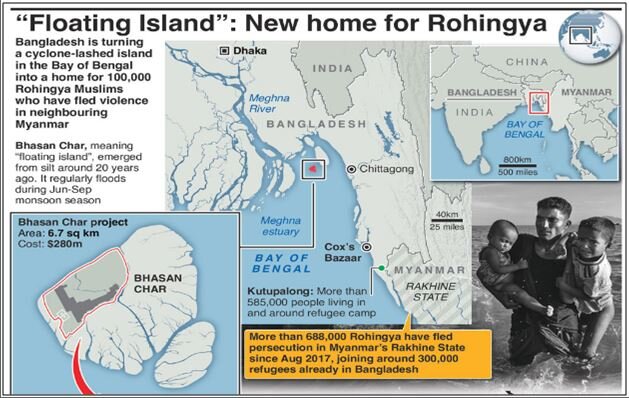International Relations
Rohingyas at Isolated Bangladesh Island
- 07 Dec 2020
- 6 min read
Why in News
Recently, authorities in Bangladesh sent the first group of more than 1,500 Rohingya refugees to an isolated Bhasan Char island in the Bay of Bengal.
Key Points
- Background:
- The Rohingya people are stateless, Indo-Aryan ethnic group who reside in Rakhine State, Myanmar.
- There were an estimated 1 million Rohingya living in Myanmar before the 2016–17 crisis. An estimated 625,000 refugees from Rakhine, Myanmar, had crossed the border into Bangladesh since August 2017. The majority are Muslim while a minority are Hindu.
- They are described by the United Nations (UN) as one of the most persecuted minorities in the world.
- The Rohingya population is denied citizenship under the 1982 Myanmar nationality law. They have denied the Rohingya the possibility of acquiring a nationality.
- Although Rohingya history in the region can be traced back to the 8th century, Myanmar law does not recognize the ethnic minority as one of the eight national indigenous races.
- The flow of Rohingya from Myanmar intensified in 2017 and the coast near the Bangladeshi city of Cox’s Bazar was taken over by refugee settlements.
- In June 2015, the Bangladesh government suggested resettling Rohingya refugees on the Bhasan Char island under its Ashrayan Project.
- Recent development:
- The Bangladesh government is moving these refugees to an isolated island known as Bhasan Char which is located 21 miles (34 kilometers) from the mainland.
- Bhasan Char:
- Bhasan Char (Floating Island) also known as Char Piya or Thengar Char Island, is an island in Hatiya, Bangladesh. It surfaced only 20 years ago and was never inhabited.
- It was formed with Himalayan silt from the mouth of river Meghna in 2006 spanning 40 square kilometres.
- The island, which was once regularly submerged by monsoon rains, now has flood protection embankments, houses, hospitals and mosques built at a cost of more than 112 million dollars by the Bangladesh navy.
- It is underwater from June to September because of the monsoon.
- Bhasan Char:
- The Bangladesh government is moving these refugees to an isolated island known as Bhasan Char which is located 21 miles (34 kilometers) from the mainland.
- Concern:
- As Bhashan Char falls in an ecologically fragile area prone to floods, erosion and cyclones, it is not considered safe for human settlements.
- The UN and various other human rights agencies are against this relocation as they believe that Rohingya refugees must be able to make a free and informed decision about relocating to the island based upon relevant, accurate and updated information.
- Earlier this year, Amnesty International released a damning report on the conditions faced by Rohingyas already living on the island.
- The report contained allegations of cramped and unhygienic living conditions, limited food and healthcare facilities, a lack of phones, as well as cases of sexual harassment by both the Navy and local labourers engaging in extortion.
- India’s Stand:
- India maintains that Rohingyas are a threat to its national security and have links with international terror groups.
- India has so far refused to exert any pressure on Myanmar for taking the Rohingyas back and giving them recognition as the citizens of Myanmar.
- International Provisions to Protect the Rights of Rohingyas:
- International Covenant on Civil and Political Rights (ICCPR): Even though the refugees are foreigners in the country of asylum, by virtue of Article 2 of the ICCPR, 1966, they could enjoy the same fundamental rights and freedoms as nationals.
- The right to equality before the law, equal protection of the law and non-discrimination which form a cornerstone of international human rights laws call for banning discrimination against refugees based on their status as such.
- The 1951 Refugee Convention : The core principle of the convention is non-refoulement, which asserts that a refugee should not be returned to a country where they face serious threats to their life or freedom.
- International Covenant on Civil and Political Rights (ICCPR): Even though the refugees are foreigners in the country of asylum, by virtue of Article 2 of the ICCPR, 1966, they could enjoy the same fundamental rights and freedoms as nationals.
Way Forward
- While pressing for eventual repatriation, Bangladesh and external partners should move past short-term planning and work together to build safe housing, improve refugees’ educational and livelihood opportunities, and support refugee-hosting communities. Bangladesh should also roll back its counterproductive security measures and plans for relocations to Bhasan Char.
- It is not too late for Myanmaar to change course and reorient itself to transform into a democracy that embraces human rights for all, by addressing issues of discrimination, implementing victim-centered justice mechanisms, rewriting laws and holding those who have violated human rights accountable.







